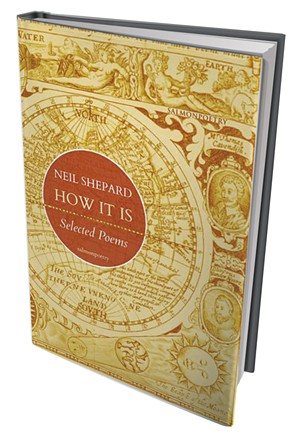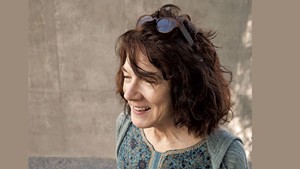
- How It Is: Selected Poems by Neil Shepard, Salmon Poetry, 178 pages. $25.
Every book is a new adventure — or something like that — but Neil Shepard's How It Is: Selected Poems gathers an unusually large number of adventures in one place. The collection of mostly free-verse poems spans 22 years, draws inspiration from trips around the world, and explores illness, death, adulthood and racism (separately, for the most part).
Shepard splits his time between Vermont and New York City, where he teaches poetry workshops at Poets House. The author of seven other books of poetry, he is the senior and founding editor of Green Mountains Review, the literary journal based at Northern Vermont University (formerly Johnson and Lyndon state colleges).
At first glance, the collection's title may sound patronizing. How often has someone said, "That's just how it is" to explain away society's ills as unavoidable truths? The opposite, and preferable, response is to view the world as malleable, something to be shaped through love or will.
Shepard may call them "how it is," but the poems between the optimistically yellow covers of this book reflect simply what he sees, molded and shaped into dense verses packed with verbal barrel rolls, associative leaps and dives into history. The world through Shepard's eyes isn't fixed chronologically or emotionally; it's full of ideas colliding and coalescing.
The writer appears to regard the subject of each poem as a book in itself, something to be explored and flipped through with excitement. The result is a collection of poems energized by his apparent interest in, well, everything.
Some poems, particularly early ones, are almost exercises in place making. In "The Bell Bird," written in New Zealand (according to an italicized note), Shepard writes, "I smell lemon everywhere, / lemon-air and lemon-earth and lemon-trees / and the long-leafed eucalyptus."
Poems like this express a deep yearning to be united with something outside the human body, out of reach. As the poem's speaker imitates a bellbird, the sound becomes "a bell run in the throat / of something that would be wild."
But Shepard doesn't confine his verse to the natural world. "The Red Stick: White Like Me" takes a swing at racism and fear. The free-verse poem details the speaker's journey to the South and his first violent encounter with the realities of institutionalized racism. After he finds he is unwelcome in a black neighborhood, a colleague offers him a baseball bat, painted red, to keep away intruders. The speaker refuses it.
It's not an easy poem to read. Readers may wonder whether this particular white male's perspective adds something new to the conversation or is simply consistent with some white people's fear of black violence. As if recognizing this, Shepard addresses the reader as the speaker's internal debate nears its pinnacle. "I hated it perhaps even more than / you do, reading this, thinking, his choice / is as easy as black and white."
That intimacy and tension — here achieved through direct address — appear elsewhere in the collection as well. In "Hominid Up," Shepard imagines "the old hominid," the ancestor of humanity, as a part of his modern psyche. The poem contrasts the past and present selves artfully: "I wake often and watch him scratch himself / with a twig that could pass for a pencil / or poke at a moon-lit line of ants that / resembles this scratched pentameter."
Here, Shepard achieves a sense of intimacy by letting the speaker's two personae slip across each other like projector transparencies. Can you separate the two? Yes, but it's more beautiful to view them together.
This is How It Is — a wealth of imagery, intellect and musical language that calls you to dive deep. It's not a bad dive, either.





Comments
Comments are closed.
From 2014-2020, Seven Days allowed readers to comment on all stories posted on our website. While we've appreciated the suggestions and insights, right now Seven Days is prioritizing our core mission — producing high-quality, responsible local journalism — over moderating online debates between readers.
To criticize, correct or praise our reporting, please send us a letter to the editor or send us a tip. We’ll check it out and report the results.
Online comments may return when we have better tech tools for managing them. Thanks for reading.